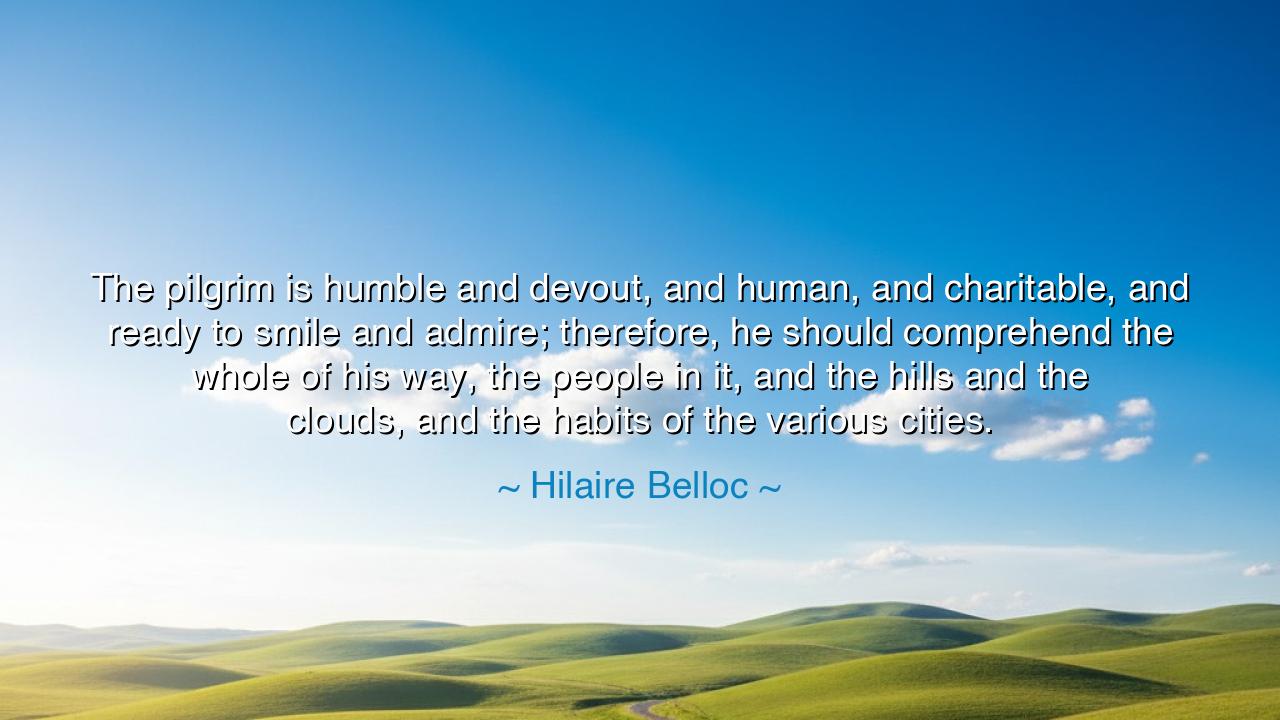
The pilgrim is humble and devout, and human, and charitable, and
The pilgrim is humble and devout, and human, and charitable, and ready to smile and admire; therefore, he should comprehend the whole of his way, the people in it, and the hills and the clouds, and the habits of the various cities.






Hear the words of Hilaire Belloc, poet, traveler, and seeker of truth: “The pilgrim is humble and devout, and human, and charitable, and ready to smile and admire; therefore, he should comprehend the whole of his way, the people in it, and the hills and the clouds, and the habits of the various cities.” In these words lies the essence of the journey, not merely across land, but across life itself. For Belloc reminds us that the path of the pilgrim is not measured only in miles, but in the openness of the soul to all that lies along the road.
The pilgrim is more than a wanderer. He is one who walks with purpose, whose feet press the earth in search of meaning. Yet Belloc tells us the pilgrim must be humble—knowing he does not own the path, but receives it as a gift. He must be devout, keeping his eyes lifted toward the heavens even as his body trudges through the dust. He must be human, acknowledging his weakness, and charitable, offering kindness to those he meets. With such a spirit, every step becomes sacred.
And what of the smile? Belloc reminds us that joy and admiration must accompany the pilgrimage. The road is long, and without the power to smile, the heart would grow heavy. To admire the hills and the clouds, to rejoice in the strangeness of a city’s customs, to greet the stranger with warmth—these are not diversions from the journey, but the journey itself. For the pilgrim who only seeks the destination misses the miracle of the way.
The ancients knew this truth. Recall the tales of the Camino de Santiago, where countless pilgrims walked not only to reach the shrine, but to be transformed by the path. They shared bread with strangers, marveled at mountains, endured storms, and arrived not only at Compostela, but at a new understanding of themselves. The road itself became their teacher. So too, Belloc declares, the pilgrim must comprehend “the whole of his way”—not just the holy site at the end, but the sacredness woven into every mile.
History offers another image in the travels of Marco Polo. Though he journeyed for trade and discovery, his writings reveal a man who learned to observe, to marvel at the habits of peoples, the grandeur of cities, the wonders of nature. Because he was ready to admire, he returned not merely with riches, but with wisdom. This is Belloc’s counsel: the pilgrim’s greatness lies not in endurance alone, but in attentiveness—seeing the world in its fullness, and receiving it with humility.
The lesson is clear: each of us is a pilgrim upon the earth. Our lives are journeys through time, and like those who walk to shrines, we will find meaning only if we travel with the right spirit. To rush past the days without gratitude, to scorn the customs of others, to walk with a hardened heart—this is to miss the very gift of the road. But to walk humbly, to smile, to admire, to extend charity—this is to comprehend not only our path, but ourselves.
Therefore, beloved, let this be your practice: live as a pilgrim, not as a conqueror. Be humble in your steps, devout in your vision, charitable in your dealings, and joyful in your countenance. Admire the clouds, the hills, the strangers, and the cities, for all are part of your way. For the end of the pilgrimage is not only at the shrine or in the grave, but in the transformation of the traveler’s soul. And when your journey is complete, it will be said of you that you walked with a pilgrim’s heart, and thus understood the whole of your way.






AAdministratorAdministrator
Welcome, honored guests. Please leave a comment, we will respond soon